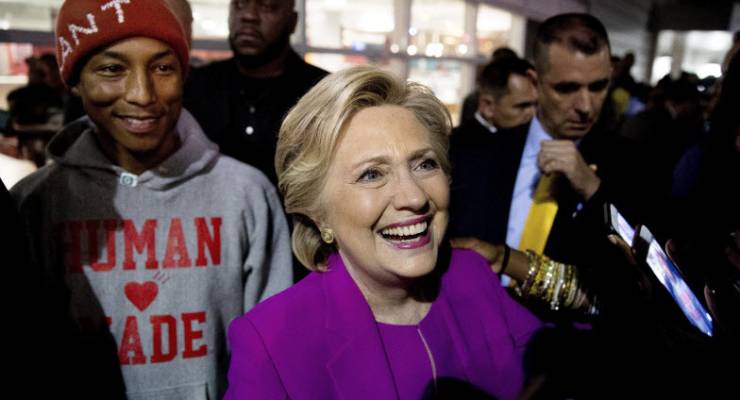
Next Wednesday, Australian time, we will be living in the post-truth age. We will know if anti-elitist populism has triumphed over sometimes self-serving knowledge and expertise. Alternatively, we will know the extent of the damage to the surviving rationality of objective self-interest within the framework of a fractured social contract. Either way, rational debate about preferences and processes will be a thing of the past.
In this ambiguous new world, Donald Trump will have become President-elect of the United States or Hillary Clinton will have become so. And we will come to this situation knowing very little of what either presidential aspirant plans to actually do.
Throughout the presidential campaign, we have witnessed much more styles of political combat than heard of policies. The styles of political combat of the adversaries do tell us something of what each might be like in office, but there’s been little apart from a couple of sensationalist headline grabs about policy.
Stripping away the sensationalism (and much of the entertainment value), there is much that defines both Trump and Clinton as being more or less conventional right and left politicians. Trump is in favour of lower taxes, especially for the corporate sector, is nationalist in outlook, deregulatory and is likely to support social conservative policies.
Clinton, by way of contrast, is in favour of higher taxes for big earners, is internationalist in outlook and is more likely to support regulatory and socially progressive policies. However, for either to successfully prosecute a political agenda they will have to work with Congress, which is the lesser discussed but equally important part of the November 8 electoral process.
Of the two, Trump will have the most difficulty implementing his broad policy position, especially around tax cuts. In substantive economic terms, Trump has promised to cut corporate tax from 35% to 15% and reduce the number of tax brackets from seven to three, among other measures.
He has also promised to boost future jobs growth by investing in infrastructure development and instituting tariff barriers to create, he claims, 25 million jobs over 10 years. It has been estimated that the tax cuts alone will cost almost $6 trillion in revenue over 10 years, which would add a further third to US government debt.
Such revenue loss conflicts with further infrastructure development and would be unlikely to pass Congress, especially if the Republicans lose control of the Senate. In reality, any tax cuts could only be implemented through cuts to government services. If Trump loses the tax cuts battle, he could be expected to seek populist, perhaps ethnic or religious, scapegoats, to divert attention away from the issue.
Similarly, while instituting tariff barriers and ending “unfair” free trade agreements will provide a short-term boost to domestic production, it will also trigger a jump in domestic inflation and likely trigger a trade war, especially with China. This will have negative flow-on effects to the global economy.
Clinton, on the other hand, has tended to favour free trade agreements, even if that enthusiasm has been curbed by the Bernie Sanders wing of the Democrats, who remain central to her winning the presidency.
Clinton’s proposal to increase top end tax is intended to fund expanded social welfare programs, recognising the US’ growing wealth inequality is both hurting poorer and middle Americans as well as driving many more desperate citizens towards simplistic, populist solutions.
Trump’s nationalism and isolationism is reflected in his plan to build a wall between the US and Mexico to stop illegal immigration and in a general inclination to stay out of intervention in overseas conflicts. This inclination is, however, not an absolute and his somewhat volatile temperament could encourage him to launch sudden military interventions, especially in response to provocations.
It is not clear how Trump would respond to an increasingly assertive China but he has expressed a more accommodationist position regarding Russia, with which he has an ambiguous relationship.
Clinton, on the other hand, sees the US’ role as continuing to be a, if not the, arbiter of global affairs. Clinton is more “hawkish” than Obama and is likely to assert a longer-term US presence in Iraq, not least to balance what she sees, on one side, as Russia’s substantial influence in Syria and, on the other, its alliance with Iran.
In many respects, a Clinton victory will result in a policy suite broadly in line with existing US policy, both at home and abroad. Clinton may be more assertive than Obama, but the general policy contours will remain much the same. This business-as-usual approach will calm otherwise volatile global markets.
A Trump victory will mark a sharp turn in US policy, both at home and abroad. If Trump tears up existing trade agreements and imposes tariff restrictions, the global economy will be in for a bumpy ride.
What is unlikely to change, however, is that popular mistrust of the elite will remain entrenched and probably deepen in either event. With the decline of “legacy” media and a loss of faith or even interest in evidence and expertise, “truth” in public discourse will be entrenched as the malleable plaything of startling catch-phrases and clever memesters.
It is, perhaps, this latter aspect that will come to define how we increasingly understand politics, and not just in the US, in the post-November 8 era.
*Damien Kingsbury is professor of international Politics at Deakin University








A sober article. It would be nice if the poor cohort that supports Trump realised that without investment in health and education, to be funded by wealthy people who pay little or no tax, they and their young will simply get poorer. And that religious and ethnic scapegoats are simple distractions from them focussing on the money trail – money going out the back door to rich people through tax cuts.